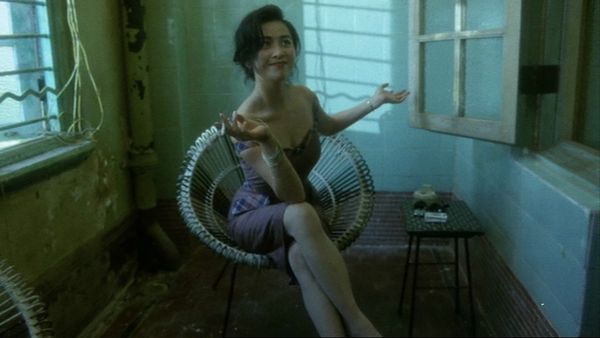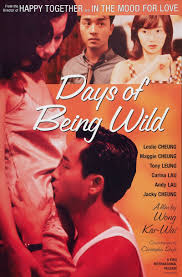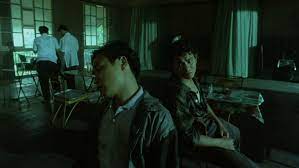Days of Being Wild (1990)

Days of Being Wild is a 1990 Hong Kong film directed by Wong Kar-wai, known for its lush visuals, evocative storytelling, and exploration of themes such as love, longing, and the transient nature of human relationships. This film marks Wong’s first feature and is a significant entry in his oeuvre, setting the stage for his later works that have garnered international acclaim. With its unique narrative style and rich character development, Days of Being Wild is a poignant meditation on youth and emotional disconnection.
Set in 1960s Hong Kong, the film follows the life of Yuddy, played by Leslie Cheung, a charming yet emotionally detached young man who struggles with his identity and relationships. Yuddy’s quest for love leads him to engage with several women, including the sweet and naive Su Lizhen (Maggie Cheung) and the more worldly and experienced Lula (Carina Lau). His interactions with these characters reveal his deep-seated fears of intimacy and commitment, as he oscillates between moments of affection and emotional distance.

One of the film’s standout features is its exploration of the complexities of love and the human condition. Yuddy’s relationships are characterized by a sense of impermanence, reflecting the broader theme of transience that permeates the film. Wong Kar-wai’s script skillfully captures the bittersweet nature of love, highlighting the characters’ desires and disappointments. The film’s structure allows for a non-linear narrative, offering glimpses into the characters’ lives and emotions, creating a tapestry of interconnected stories that resonate with universal feelings of longing and loss.
Visually, Days of Being Wild is a stunning work of art. Cinematographer Christopher Doyle’s use of color, light, and shadow creates a dreamlike atmosphere that enhances the film’s emotional depth. The vibrant hues and soft focus lend a nostalgic quality to the storytelling, immersing viewers in the world of 1960s Hong Kong. The composition of each shot is deliberate, with Wong carefully framing characters in their environments, emphasizing their isolation and desire for connection.

The film’s score, featuring a mix of traditional and contemporary music, further amplifies its emotional impact. The haunting melodies and rhythmic beats complement the visuals, evoking feelings of nostalgia and yearning. This synergy between sound and image is a hallmark of Wong Kar-wai’s filmmaking style, drawing viewers deeper into the characters’ inner lives.
The performances in Days of Being Wild are exceptional, with Leslie Cheung delivering a charismatic yet complex portrayal of Yuddy. His ability to convey both charm and emotional turmoil makes him a compelling character to follow. Maggie Cheung and Carina Lau also shine in their respective roles, embodying the different facets of love and desire that Yuddy grapples with. The chemistry among the cast enhances the film’s exploration of relationships, making their emotional struggles palpable and relatable.

Days of Being Wild received critical acclaim upon its release, praised for its innovative storytelling and visual style. Although it was not a commercial success initially, it has since gained recognition as a classic of Hong Kong cinema and a significant work in Wong Kar-wai’s filmography. The film’s influence can be seen in subsequent works by Wong and other filmmakers who have sought to capture the complexities of love and identity.
In conclusion, Days of Being Wild is a beautifully crafted film that offers a profound exploration of love, longing, and the fleeting nature of relationships. Wong Kar-wai’s direction, combined with stunning cinematography and strong performances, creates an immersive experience that resonates with audiences. The film’s introspective narrative and rich visual language invite viewers to reflect on their own experiences of love and connection, making it a timeless entry in the realm of romantic cinema. Whether revisiting it or discovering it for the first time, Days of Being Wild remains a compelling exploration of the human heart and the intricacies of existence.











